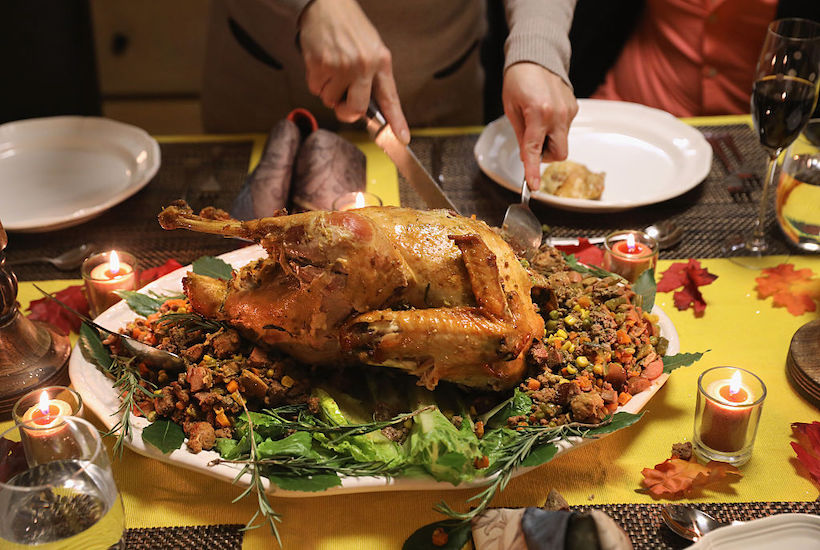As an American living in Australia, it can be hard going at times – especially now. No sumptuous turkey dinner complete with all the trimmings on this special day. Not even a pumpkin pie with whipped cream. Life is tough for us Yanks living abroad.
But it was tough for the first Pilgrims as well who were also living abroad. It is their story that Americans celebrate each year at Thanksgiving. And it is a story that needs to be retold, since most folks – including most Americans – no longer know why the holiday is called what it is.
Coupled with our historical amnesia, our political correctness, our growing secularism, and our ever-increasing reliance on the state for all our “blessings,” it is no wonder we are being dumbed down here. As Thomas Sowell once put it: “Thanksgiving may be our most old-fashioned holiday. Gratitude itself seems out of date at a time when so many people feel ‘entitled’ to whatever they get—and indignant that they didn’t get more.”
So it is no surprise that many want to rename the day, just as they have thrown Christ out of Christmas. The left wants to wipe out all knowledge of our Christian past, and turn America and the West into a vast secular desert, bereft of its transcendent and supernatural heritage.
And they want to turn Western countries into yet more socialist paradises. Too bad that has never worked so far. Speaking of which, the early Pilgrims did in fact have a go at this – and it was a complete disaster. With so many leftist politicians jumping on this bandwagon, some recent articles have appeared to set the record straight as to the early Pilgrims.
Let me draw from a few of them. Nolan Finley introduces the story:
Of all the lessons of America’s First Thanksgiving, none is more enduring than that of the rewards of empowering individuals to determine their own fate. In 1623, the 53 surviving Pilgrims of the Jamestown colony, joined by about 90 Native Americans of the Wampanoag tribe, sat down for three days of prayer and feasting in celebration of the first bountiful harvest in this new land.
For two previous years, the crops, primarily corn, or maize, were poor, barely producing enough to keep the settlers alive. What they raised was supplemented by what they could kill and scavenge in the surrounding forests.
But in the spring of 1623, the colony’s governor, William Bradford, came up with a novel idea for stimulating production.
During those first two growing seasons, the tillable land was worked in common, and the meager harvest shared equally. Bradford’s account places the daily corn ration during the worst of times, incredibly, at just 3 kernels. Starvation and disease were constants. Clearly, the communal approach wasn’t working. Bradford writes that most of the work was performed by a half dozen of the strongest young men, whom the whole community relied on for sustenance.
So Bradford set a new course. Instead of holding all the land in common, it was divided between the colonists to plant and work themselves. His words, cleaned up for the modern reader: “This had very good success; for it made all hands very industrious, so as much more corn was planted then otherwise would have been by any means ye governor or any other could use, and saved him a great deal of trouble, and gave far better content. The women now went willingly into ye field, and took their little-ones with them to set corn, which before would allege weakness, and inability; whom to have compelled would have been thought great tyranny and oppression.”
Lawrence W. Reed offers more of the story:
The “common property” approach killed off about half the settlers. Governor Bradford recorded in his diary that everybody was happy to claim their equal share of production, but production only shrank. Slackers showed up late for work in the fields, and the hard workers resented it. It’s called “human nature.”
The disincentives of the socialist scheme bred impoverishment and conflict until, facing starvation and extinction, Bradford altered the system. He divided common property into private plots, and the new owners could produce what they wanted and then keep or trade it freely.
Communal socialist failure was transformed into private property/capitalist success, something that’s happened so often historically it’s almost monotonous. The “people over profits” mentality produced fewer people until profit—earned as a result of one’s care for his own property and his desire for improvement—saved the people.
He concludes his piece this way:
Consider this as you feast at the Thanksgiving table this week: The people who raised the turkey didn’t do so because they wanted to help you out. The others who grew the cranberries and the yams didn’t go to the trouble and expense out of some altruistic impulse or because of some nebulous “sharing” fantasy. Sacrificial rituals, even if they make you feel good, rarely bake a bigger pie. Charity is laudable, and I engage in it, too, but it’s not an engine of production or prosperity. For that, you need profit, incentive, and private property.
In North Korea and Venezuela, socialist regimes work to see that almost nobody makes a profit or owns a private business. There won’t be anything like widespread Thanksgiving dinners in either country this week, and that’s no coincidence. I wonder if that lesson is still taught in schools these days; polls that suggest young people are attracted to socialism suggest maybe it isn’t.
I’ll be offering gratitude for more than just good food on Thanksgiving Day. I’m going to give a prayerful thanks for private property and the profit motive that has made abundance possible. When God instilled a measure of peaceful, productive self-interest into the human mind, he knew what he was doing.
Let me close with some words found in one of Ronald Reagan’s Thanksgiving addresses:
Today we have more to be thankful for than our pilgrim mothers and fathers who huddled on the edge of the New World that first Thanksgiving Day could ever dream. We should be grateful not only for our blessings, but for the courage and strength of our ancestors which enable us to enjoy the lives we do today. Let us reaffirm through prayers and actions our thankfulness for America’s bounty and heritage.
Bill Muehlenberg is a Melbourne cultural commentator.
Got something to add? Join the discussion and comment below.
Got something to add? Join the discussion and comment below.
Get 10 issues for just $10
Subscribe to The Spectator Australia today for the next 10 magazine issues, plus full online access, for just $10.


























Comments
Don't miss out
Join the conversation with other Spectator Australia readers. Subscribe to leave a comment.
SUBSCRIBEAlready a subscriber? Log in